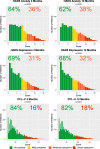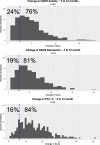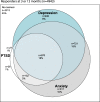Anxiety, Depression and Post Traumatic Stress Disorder after critical illness: a UK-wide prospective cohort study
- PMID: 30466485
- PMCID: PMC6251214
- DOI: 10.1186/s13054-018-2223-6
Anxiety, Depression and Post Traumatic Stress Disorder after critical illness: a UK-wide prospective cohort study
Abstract
Background: Survivors of intensive care are known to be at increased risk of developing longer-term psychopathology issues. We present a large UK multicentre study assessing the anxiety, depression and post-traumatic stress disorder (PTSD) caseness in the first year following discharge from an intensive care unit (ICU).
Methods: Design: prospective multicentre follow-up study of survivors of ICU in the UK.
Setting: patients from 26 ICUs in the UK.
Inclusion criteria: patients who had received at least 24 h of level 3 ICU care and were 16 years of age or older.
Interventions: postal follow up: Hospital Anxiety and Depression Score (HADS) and the Post-Traumatic Stress Disorder (PTSD) Check List-Civilian (PCL-C) at 3 and 12 months following discharge from ICU.
Main outcome measure: caseness of anxiety, depression and PTSD, 2-year survival.
Results: In total, 21,633 patients admitted to ICU were included in the study. Postal questionnaires were sent to 13,155 survivors; of these 38% (4943/13155) responded and 55% (2731/4943) of respondents passed thresholds for one or more condition at 3 or 12 months following discharge. Caseness prevalence was 46%, 40% and 22% for anxiety, depression and PTSD respectively; 18% (870/4943 patients) met the caseness threshold for all three psychological conditions. Patients with symptoms of depression were 47% more likely to die during the first 2 years after discharge from ICU than those without (HR 1.47, CI 1.19-1.80).
Conclusions: Over half of those who respond to postal questionnaire following treatment on ICU in the UK reported significant symptoms of anxiety, depression or PTSD. When symptoms of one psychological disorder are present, there is a 65% chance they will co-occur with symptoms of one of the other two disorders. Depression following critical illness is associated with an increased mortality risk in the first 2 years following discharge from ICU.
Trial registration: ISRCTN Registry, ISRCTN69112866 . Registered on 2 May 2006.
Keywords: Anxiety; Critical care; Critical illness; Depression; Intensive care; Multicentre study; Outcome assessment; PCL-C; PICS; PTSD; Post-Intensive Care Syndrome; Post-traumatic stress disorder; Post-traumatic stress disorder civilian checklist; Postal; Questionnaire; Survivors.
Conflict of interest statement
Ethics approval and consent to participate
This study was granted national ethics approval. Phases 1 and 2 - Oxford Research Ethics Committee B (REC 06/Q1605/17), phase 3 - South Central – Berkshire REC (11/SC/0172). Informed written consent to participate in the study was obtained from all patients who chose to respond to a questionnaire.
Consent for publication
Not applicable.
Competing interests
All authors have completed the ICMJE uniform disclosure form at
Publisher’s Note
Springer Nature remains neutral with regard to jurisdictional claims in published maps and institutional affiliations.
Figures





References
-
- Judy E. Davidson, RN, CNS, DNP, FCCM; Ramona O. Hopkins, PhD; Deborah Louis, RN, MSN; Theodore J. Iwashyna, MD P (2013) Post-intensive care syndrome. In: Soc Crit Care Med http://www.myicucare.org/Thrive/Pages/Post-intensive-Care-Syndrome.aspx. Accessed 12 Feb 2018.
-
- Wade Dorothy M, Howell David C, Weinman John A, Hardy Rebecca J, Mythen Michael G, Brewin Chris R, Borja-Boluda Susana, Matejowsky Claire F, Raine Rosalind A. Investigating risk factors for psychological morbidity three months after intensive care: a prospective cohort study. Critical Care. 2012;16(5):R192. doi: 10.1186/cc11677. - DOI - PMC - PubMed
Publication types
MeSH terms
LinkOut - more resources
Full Text Sources
Medical
Miscellaneous

